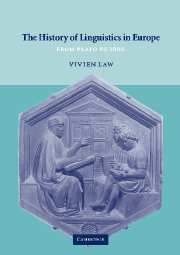Book contents
- Frontmatter
- Dedication
- Contents
- List of illustrations
- List of maps
- List of boxes
- Preface
- 1 Getting ready to study the history of linguistics
- 2 Greek philosophy and the origins of western linguistics
- 3 Towards a discipline of grammar: the transition from philosophy
- 4 From literacy to grammar: describing language structure in the ancient world
- 5 Christianity and language
- 6 The early Middle Ages
- 7 The Carolingian Renaissance
- 8 Scholasticism: linking language and reality
- 9 Medieval vernacular grammars
- 10 The Renaissance: discovery of the outer world
- 11 A brief overview of linguistics since 1600
- 12 Becoming a historian of linguistics
- Research resources in the history of linguistics
- Notes
- Index
6 - The early Middle Ages
Published online by Cambridge University Press: 05 March 2015
- Frontmatter
- Dedication
- Contents
- List of illustrations
- List of maps
- List of boxes
- Preface
- 1 Getting ready to study the history of linguistics
- 2 Greek philosophy and the origins of western linguistics
- 3 Towards a discipline of grammar: the transition from philosophy
- 4 From literacy to grammar: describing language structure in the ancient world
- 5 Christianity and language
- 6 The early Middle Ages
- 7 The Carolingian Renaissance
- 8 Scholasticism: linking language and reality
- 9 Medieval vernacular grammars
- 10 The Renaissance: discovery of the outer world
- 11 A brief overview of linguistics since 1600
- 12 Becoming a historian of linguistics
- Research resources in the history of linguistics
- Notes
- Index
Summary
Linguistic thought in the Middle Ages
With this chapter we enter the western Middle Ages properly speaking – the millennium between Priscian and the Northern Renaissance, roughly 500 to 1500. Throughout this period scholars across Europe dedicated themselves to the twofold task of working through what they had inherited from Greco-Roman Antiquity, and of reconciling that inheritance with Christian doctrine. This long-drawn-out process took place in stages defined both by the character of the linguistic thinking of the epoch and by the classical writings on language known at the time. For by no means all the ancient writings on language that we have met in earlier chapters were known in every part of western Europe continuously from the end of Antiquity. Some monastic libraries had half-a-dozen Late Latin grammars, others a different half-dozen, and a few especially well-stocked collections had ten or more. Rarely did any two libraries own quite the same selection. Some texts were virtually unknown for hundreds of years, coming back into circulation after a lapse of several centuries. Thus, Priscian's Partitiones and in some areas his Institutiones grammaticae, and Aristotle's Categories and De interpretatione were unknown up until a little before 800; Aristotle's remaining logical writings and the Metaphysics until around 1150; and Varro's De lingua latina until 1355. For this reason alone it would be wrong to regard linguistic thought in the Middle Ages as a monolithic whole. And throughout these centuries, people's interests and priorities changed, as did their views on the best ways to teach and present linguistic doctrine.
- Type
- Chapter
- Information
- The History of Linguistics in EuropeFrom Plato to 1600, pp. 112 - 138Publisher: Cambridge University PressPrint publication year: 2003

